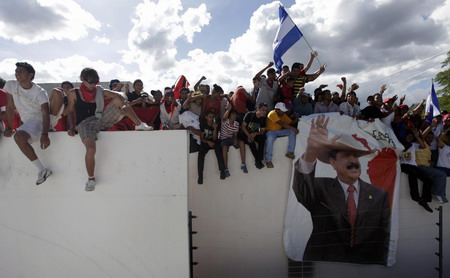Mobile
Ousted leader returns to Honduras, defies arrest
2009-Sep-22 13:21:56
 |
|
Supporters of ousted President Manuel Zelaya welcome him outside the embassy of Brazil in Tegucigalpa September 21, 2009. Zelaya sneaked back into Honduras on Monday almost three months after he was toppled in a coup, and took refuge in the Brazilian embassy to avoid arrest by the de facto government. [Agencies]
|
The US State Department announced September 4 that it would not recognize results of the presidential vote under current conditions. The coup has shaken up Washington's relations with Honduras, traditionally one of its strongest allies in Central America.
The secretary general of the Organization of American States, Jose Miguel Insulza, called for calm and warned Honduran officials to avoid any violation of the Brazilian diplomatic mission. "They should be responsible for the safety of president Zelaya and the Embassy of Brazil," he said.
Brazilian Foreign Minister Celso Amorin said neither his country nor the OAS had any role in Zelaya's journey before taking him in.
"We hope this opens a new stage in negotiations," Amorin said. He also warned: "If something happens to Zelaya or our embassy it would be a violation of international law," which bars host countries from arresting people inside diplomatic missions.
Honduras' Foreign Relations Department criticized Brazil, saying it was violating international law by "allowing Zelaya, a fugitive of Honduran justice, to make public calls to insurrection and political mobilization from its headquarters."
Micheletti urged Brazil in a nationwide radio address to turn Zelaya over to Honduran authorities.
In the days following the coup, at least two of the thousands of demonstrators who took to the streets were killed during clashes with security forces. Thousands of other Hondurans demonstrated in favor of the coup.
The country's Congress and courts, alarmed by Zelaya's political shift into a close alliance with leftist Venezuelan President Hugo Chavez and Cuba, backed Zelaya's removal.
He was arrested on orders of the Supreme Court on charges of treason and abuse of power for ignoring court orders against holding a popular referendum on reforming the constitution.
Micheletti said Zelaya sought to remove a ban on re-election _ grounds for immediate removal from office under the Honduran constitution. Zelaya denies any such plan.
International leaders were almost unanimously against the armed removal of the president, alarmed that it could return Latin America to a bygone era of coups and instability. The United States, European Union and other agencies have cut aid to Honduras to press for his return.
Zelaya said he had "evaded a thousand obstacles" to return, traveling 15 hours by land in different vehicles. He declined to give specifics on who helped him cross the border, saying that he didn't want to jeopardize their safety.
His staunch supporter, Chavez, described the journey: "President Manuel Zelaya, along with four companions, traveled for two days overland, crossing mountains and rivers, risking their lives. They have made it to Honduras."
If the interim administration attempts to imprison Zelaya, protesters who have demonstrated against his ouster could turn violent, said Vicki Gass at the Washington Office on Latin America.
"There's a saying about Honduras that people can argue in the morning and have dinner in the evening, but I'm not sure this will happen in this case," said Gass. "It's been 86 days since the coup. Something had to break and this might be it."
[Jump to ]
Nation | Biz | Comment | World | Celebrity | Odds | Sports | Travel | Health
m.chinadaily.com.cn
To subscribe to China Daily, call 010-64918763 or email to circu@chinadaily.com.cn
